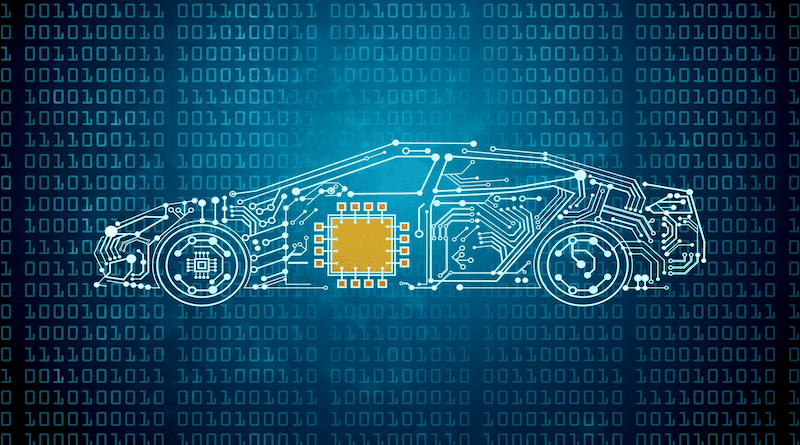Mobility: Supercomputers Will Control Future Cars
Future highly automated and networked vehicles will require powerful computer systems to execute complex computations and process huge data volumes. Within the framework of the CeCaS project, 30 partners from industry and research are now developing suitable processors, interfaces, and system architectures for this purpose. Two institutes of Karlsruhe Institute of Technology (KIT) are involved in this project that is coordinated by Infineon. CeCaS is funded by the Federal Research Ministry within the MANNHEIM Initiative.
Future generations of vehicles will be increasingly automated and networked to enhance autonomy in road traffic and gradually relieve drivers. This will require a high computation capacity that can only be reached by most powerful computer systems – in the vehicles, along the roads, or at computing centers. Apart from internal communication systems and systems connected to the outer world, vehicles will need a central computer. It will consist of components executing complex computations, processing huge data volumes, and reaching highest reliability.
KIT and TUM Have Taken over Scientific Coordination
Within the framework of CeCaS (stands for: CentralCarServer), 30 partners from industry and research are working on architectures, software engineering principles, and the design of future high-performance computers in cars. The project is coordinated by Infineon Technologies AG. Scientific coordination lies with KIT, Professor Jürgen Becker, Head of the Institute for Information Processing Technology (ITIV), and Professor Jörg Henkel, Head of the Embedded Systems Group at the Institute of Computer Engineering (ITEC-CES), as well as with the Technical University of Munich (TUM), Professor Alois Knoll, Head of the Chair of Robotics, Artificial Intelligence and Embedded Systems (AIR).
“Development of scalable energy- and cost-efficient supercomputers with full automotive qualification, which meet high requirements in terms of computing capacity and complexity, will decisively contribute to the viability and technological sovereignty of German automotive industry,” Becker says. CeCaS will produce automotive supercomputing systems and processes meeting highest standards in terms of safety and reliability. To this end, the consortium will design processors, interfaces, and system architectures. The flexible software environment will be tailored to the requirements of latest algorithms in the car, especially, but not only, for the use of artificial intelligence (AI).
Hardware Accelerators for Highly Effective Image Processing
Within CeCaS, KIT is responsible for the design of novel multi-purpose hardware accelerators for highly effective image processing and the integration of reliable AI in cars. The new accelerators are integrated in high-performance processes via high-speed interfaces. Work of the researchers in particular focuses on AI components between the sensor nodes and the central computer. Moreover, KIT will develop tools for the analysis of and compliance with real-time criteria as well as an extensive benchmarking software to evaluate the hardware accelerators.
“Progress of automotive engineering directly depends on progress in computer engineering and computer science and in particular on the German automotive industry’s ability to use modern chip technologies,” Becker explains. “CeCaS will help German automotive industry play a leading role in global competition in the digital era.”
About CeCaS
Within its MANNHEIM Initiative (named after the automobile’s place of birth), the Federal Ministry of Education and Research (BMBF) funds CeCaS with about EUR 46 million. The total project volume amounts to approximately 90 million euros. CeCaS is scheduled for a duration of three years.
The 30 cooperation partners of the MANNHEIM-CeCaS project are: Bosch, Continental Automotive, ZF Friedrichshafen, Hella, AVL Software & Functions, Ambrosys, Infineon Technologies AG (coordination; with Infineon Technologies Dresden GmbH & Co. KG and Infineon Technologies Semiconductor GmbH), Kernkonzept, Berliner Nanotest und Design, Missing Link Electronics, Inchron, Glück Engineering, STTech, Steinbeis ZFW, Swissbit Deutschland, Karlsruhe Institute of Technology (KIT) with its institutes ITIV and ITEC-CES, FZI Research Center for Information Technology, Technical University of Munich with the Chairs AIR, LIS, and SEC, Munich University of Applied Sciences, Universität zu Lübeck, Chemnitz University of Technology, Fraunhofer ENAS, IMWS, IPMS, and IZM.

